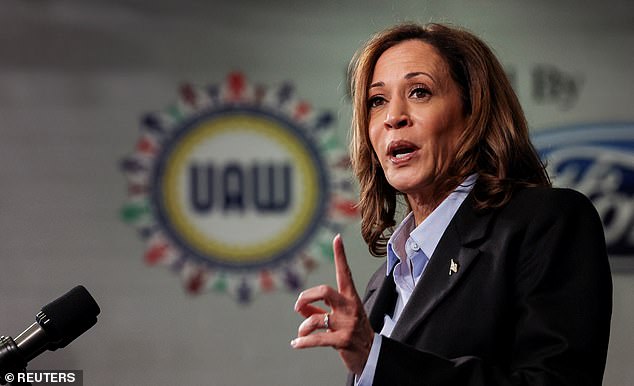Kamala Harris proposes huge new tax deduction for more than 25 million small businesses
Vice President Kamala Harris will soon unveil a proposal to significantly expand the tax cut for small businesses as she lays out her economic policy platform with just 60 days to go until the election.
The Democratic presidential candidate travels to Portsmouth, New Hampshire, on Wednesday, where she will announce a new goal: a record 25 million new business filings in her first term if elected.
The proposal includes increasing the small business startup expense deduction tenfold, from $5,000 to $50,000.
Her latest speech comes just weeks after Harris traveled to North Carolina last month to deliver her first policy address as a presidential candidate, an economic speech in Raleigh.
There she announced her plan to tackle rising prices, including a controversial plan to ban rent-seeking and measures to improve housing affordability.
The proposal includes increasing the small business startup expense deduction tenfold, from $5,000 to $50,000.
By expanding the start-up cost deduction, Harris also wants to allow small businesses to wait to claim the deduction until they make a profit, in an effort to reduce their taxes.
According to the campaign, this would mean that a small business that makes a profit of $15,000 in its first year would be able to deduct that amount and save the rest for future years. Small businesses that make a loss in their first year would be able to wait until later years to claim the deduction.
The proposal is the latest part of what Harris calls her “Opportunity Economy,” as she argues that helping the middle class will be one of her top goals from day one of her presidency.
It costs an estimated $30,000 to $40,000 in start-up and first-year costs to start a small business in the United States, so expanding the deduction could provide significant relief. However, it’s not yet clear how much the proposal would cost the government or affect the national debt.
Other parts of the vice president’s economic plan would cost $1.7 trillion, the Committee for a Responsible Federal Budget estimated. The campaign said proposals that go beyond the 2025 budget levels would be offset by higher taxes on corporations and high-income earners.
Harris supported Biden administration tax increases, including a hike in the corporate tax rate from 21% to 28% and an increase in the tax on share buybacks from 1% to 4%.
Like the president, the vice president has pledged not to raise taxes on people making less than $400,000.
Tax policy changes must be approved by Congress, but lawmakers face a looming deadline as several tax cuts passed during Donald Trump’s presidency expire next year.
Harris’ new goal of 25 million new business filings during her first term would surpass the current record of 19 million, set during the Biden administration.
On Wednesday, the vice president will also unveil a number of other initiatives that the campaign believes will cut red tape and make it easier for small businesses.
Examples include developing a standard deduction for small businesses to save time and money, making it easier to obtain a business license, and encouraging state and local governments to adjust their own regulations to benefit small businesses.

Harris’ new goal of 25 million new business filings during her first term would surpass the current record of 19 million, set during the Biden administration
At the same time, Harris will call for helping existing small businesses with several steps. One of them is for the vice president to ensure that one in three federal contract dollars goes to small businesses during her first term.
She will also advocate for a fund that would allow community development financial institutions (CDFIs) to cover the interest costs of small businesses expanding into locations and creating jobs in areas that have historically seen less investment.
Harris’ latest proposals come as the campaign also takes to the airwaves with a series of ads highlighting her economic policy proposals in key states she must win in November.
The vice president is emphasizing the economy, as recent polls show her in a neck-and-neck race with Donald Trump. But on issues, more voters have indicated they trust the Republican presidential nominee to tackle the economy and inflation, which has soared due to the coronavirus pandemic.
